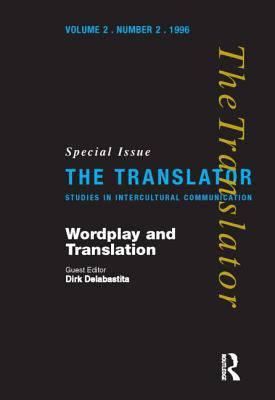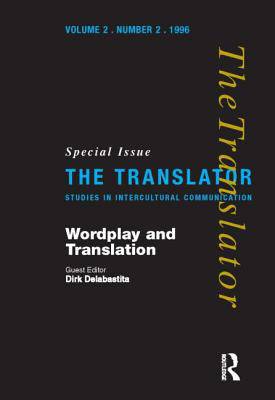
- Retrait gratuit dans votre magasin Club
- 7.000.000 titres dans notre catalogue
- Payer en toute sécurité
- Toujours un magasin près de chez vous
- Retrait gratuit dans votre magasin Club
- 7.000.0000 titres dans notre catalogue
- Payer en toute sécurité
- Toujours un magasin près de chez vous
Wordplay and Translation
Special Issue of 'The Translator' 2/2 1996
59,45 €
+ 118 points
Description
Popular and multimodal forms of cultural products are becoming increasingly visible within translation studies research. Interest in translation and music, however, has so far been relatively limited, mainly because translation of musical material has been considered somewhat outside the limits of translation studies, as traditionally conceived. Difficulties associated with issues such as the 'musicality' of lyrics, the fuzzy boundaries between translation, adaptation and rewriting, and the pervasiveness of covert or unacknowledged translations of musical elements in a variety of settings have generally limited the research in this area to overt and canonized translations such as those done for the opera.
Yet the intersection of translation and music can be a fascinating field to explore, and one which can enrich our understanding of what translation is and how it relates to other forms of expression. This special issue is an attempt to open up the field of translation and music to a wider audience within translation studies, and to an extent, within musicology and cultural studies.
The volume includes contributions from a wide range of musical genres and languages: from those that investigate translation and code-switching in North African rap and rai, and the intertextual and intersemiotic translations revolving around Mahler's lieder in Chinese, to the appropriation and after-life of Kurdish folk songs in Turkish, and the emergence of rock'n roll in Russian. Other papers examine the reception of Anglo-American stage musicals and musical films in Italy and Spain, the concept of 'singability' with examples from Scandinavian languages, and the French dubbing of musical episodes of TV series. The volume also offers an annotated bibliography on opera translation and a general bibliography on translation and music.
Yet the intersection of translation and music can be a fascinating field to explore, and one which can enrich our understanding of what translation is and how it relates to other forms of expression. This special issue is an attempt to open up the field of translation and music to a wider audience within translation studies, and to an extent, within musicology and cultural studies.
The volume includes contributions from a wide range of musical genres and languages: from those that investigate translation and code-switching in North African rap and rai, and the intertextual and intersemiotic translations revolving around Mahler's lieder in Chinese, to the appropriation and after-life of Kurdish folk songs in Turkish, and the emergence of rock'n roll in Russian. Other papers examine the reception of Anglo-American stage musicals and musical films in Italy and Spain, the concept of 'singability' with examples from Scandinavian languages, and the French dubbing of musical episodes of TV series. The volume also offers an annotated bibliography on opera translation and a general bibliography on translation and music.
Spécifications
Parties prenantes
- Editeur:
Contenu
- Nombre de pages :
- 240
- Langue:
- Anglais
- Collection :
Caractéristiques
- EAN:
- 9781900650014
- Date de parution :
- 31-03-96
- Format:
- Livre broché
- Format numérique:
- Trade paperback (VS)
- Dimensions :
- 156 mm x 234 mm
- Poids :
- 344 g

Les avis
Nous publions uniquement les avis qui respectent les conditions requises. Consultez nos conditions pour les avis.





